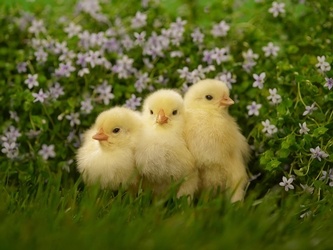INFECTION PREVENTION AND YOU
Soft, fluffy chicks are practically synonymous with spring. With their downy feathers, chicks seem like great cuddling companions, but caution must be taken to prevent infection. Many human illnesses can be acquired through contact with live poultry (including chickens, ducks, geese, and turkeys), even when the birds do not appear to be ill. Therefore, it is important to learn how to prevent infection while handling these birds.
What infections are associated with live poultry?
Several infections may be picked up through contact or close proximity with live poultry including avian influenza or "bird flu," botulism, campylobacteriosis, Escherichia coli (E. coli), West Nive virus (WNV), and Salmonella. These infections may lead to a range of illnesses from minor skin infections to much more serious issues that can result in death.
As more and more people are keeping poultry as pets, the Centers for Disease Control and Prevention (CDC) has identified an uptick in the number of people contracting Salmonella after contact with backyard birds. All live poultry can carry and transmit Salmonella, even when the birds appear healthy. According to the CDC, "Live poultry might have Salmonella germs in their droppings and on their bodies (feathers, feet, and beaks), even when they appear healthy and clean." Salmonella causes fever, diarrhea, vomiting, and abdominal cramps. In 2016, the CDC investigated eight separate outbreaks of Salmonella tied to backyard poultry. These outbreaks involved 48 states; nearly 900 people were infected.
How can these infections be prevented?
The best way to prevent any infection is by keeping your hands clean. This is expecially important after handling poultry or anything in the birds' environment. Immediately after touching food or water dishes, and cleaning cages, you should clean your hands. Using soap and running water is best, but hand sanitizer may be used instead. Make sure your hand sanitizer contains at least 60 percent alcohol.
Keep your hands - and the birds - away from your mouth. This means no kissing or snuggling near your mouth. Be sure to clean your hands before eating or drinking, and after touching poultry or any items where the birds live. The CDC says, "Don't let live poultry inside the house, expecially in areas where food or drink is prepared, served, or stored."
Young children should be supervised when around poultry. Children are more likely to become ill from contact with the germs associated with poultry.
For more information about backyard poultry, visit: www.cdc.gov/zoonotic/gi



.png?width=850&height=850&name=lane%20badge%20(1).png)


-1.png?width=711&height=711&name=healthy%20br%20(4)-1.png)

